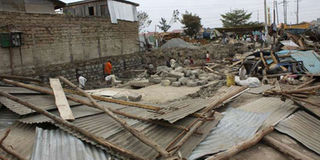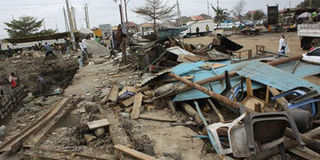Premium
Where armed gang rules land ownership matters

Some of the houses that were demolished on a disputed land in Umoja III estate in Nairobi. Rival armed groups have laid claim on the land. PHOTO | ANTHONY OMUYA | NATION MEDIA GROUP
What you need to know:
- The cartels then provide protection at a fee and resist any move of reclamation by the legally registered land owners. Some of the buyers, our sources say, are aware that the land is illegally acquired but are assured that they will not be evicted. Others are, however, unsuspecting victims lured by a good deal.
- One common rule is that buyers should not leave the land idle but must put up a structure immediately. In some instances, there are double allocations, especially when a buyer delays to develop the property.
- To complicate the situation, there are indications that police officers, county government officials and politicians also benefit from such illegally acquired land in exchange for protection — fuelling a cycle of disputes that sometimes turn violent and take an ethnic slant.
A yellow placard in the middle of a fiery demonstration last week along Nairobi’s Kangundo Road stood out: “Kiambu Dandora Farmer’s Company Limited, Umoja III is not your colony,” it screamed in protest over harassment by suspected land grabbing gangs.
But as the tyres burnt on the tarmac and residents vented their anger, blocking the road for hours, two more houses were brought down over a dispute in the expansive piece of land, estimated at 800 acres.
Within hours, foundations had been dug up and new structures belonging to a “new owner” were beginning to take shape in place of the two houses under construction that had just been demolished.
Vigilantes ferried from neighbouring Dandora and Korogocho stood nearby providing cover to the workers as residents watched in disbelief.
By last Friday morning, construction of one of the new houses had already reached the first floor. Such takeover scenes are not uncommon along Kangundo Road where vicious land sharks are reselling already occupied land or grabbing unoccupied land then dealing ruthlessly with those that stand in their way. This has been going on for years but it boiled over in recent weeks.
COMMON RULE
As the Sunday Nation found out, a typical grabbing, sale and resale of land in the area is common. Cartels going by various names like self-help groups, land societies, saccos or simply mradi (project) lay claim to a piece of land, subdivide it and sell portions with certificates or receipts issued as proof of ownership.
The cartels then provide protection at a fee and resist any move of reclamation by the legally registered land owners. Some of the buyers, our sources say, are aware that the land is illegally acquired but are assured that they will not be evicted. Others are, however, unsuspecting victims lured by a good deal.
One common rule is that buyers should not leave the land idle but must put up a structure immediately. In some instances, there are double allocations, especially when a buyer delays to develop the property.
To complicate the situation, there are indications that police officers, county government officials and politicians also benefit from such illegally acquired land in exchange for protection — fuelling a cycle of disputes that sometimes turn violent and take an ethnic slant.
Three weeks ago, Kamlesh Ouma and Stephen Ouma were shot dead in Njiru. Kayole OCPD Ali Nuno says the two “were shot during a confrontation between members of the community and another that was laying claim to a disputed piece of land.”
“We recently called the warring parties to a meeting and solved the matter,” he says.
The neighbours, however, suspect there is more to the dispute than land.
“We were protesting over an attempted takeover of our land and somebody from the other side who is not a police officer shot five times towards us.
Kamlesh died on the spot and we rushed Stephen to Mama Lucy Kibaki Hospital where he died on arrival” says a resident, Michael Omondi, alluding to the conflict between two rival communities.
He added: “Why would you want to kill somebody over land which is not even yours? We know the people who did it, we see them every day but the police are doing nothing about it.”
These are not the only deaths in recent years suspected to be linked to land. In April, ODM youth leader Stephen Mukabana was killed at the entrance of his home in Ruai after six men confronted him, one armed with a pistol, shooting him on his head and stomach. They fled and left his Toyota Prado at the scene.
Three months later, Mr Nuno says they are still investigating his death but there are undertones that his gangland style shooting had something to do with land dealings in the area since he was the head of Bamaho Youth Group, a land buying and selling company in Obama and Chokaa estates.
His unresolved murder joined those of Onesmus Mutinda, Jared Ochok, Simon Mwangi, Stephen Mutothori and John Maina who were also involved in land buying companies. Their killings remain unresolved.
In Umoja III, the cause of the current conflict, as the Sunday Nation established, is the recent slapping of a Sh2 million bill on each of the residents. Kiambu Dandora Farmer’s Company Limited (KDFCL), which claims to own the land, wants the community to pay for it or move out.

Some of the houses that were demolished on a disputed land in Umoja III estate in Nairobi. Rival armed groups have laid claim on the land. PHOTO | ANTHONY OMUYA | NATION MEDIA GROUP
Failure to pay, they said, would lead to repossession and reselling of the land. But there has been resistance.
“I am telling you the violence you are going to see in this place will be bad. We haven’t slept for three weeks and we are not about to sleep,” said a resident, who requested anonymity.
“They have their gangs, we also have ours and no one is moving from here because the over 4,000 of us who live here have rights to this land,” said the resident.
Attempts to get a comment from KDFCL, who have an office in the area, were unsuccessful. Our team was chased away by youth guarding the office.
But throughout last week, there has been tension with rival armed groups patrolling the area.
An attempt by the gangs to demolish some semi-permanent structures led to a standoff that threatened to turn violent before Administration Police officers from a nearby camp arrived.
Multiple sources have told the Sunday Nation that a letter from the National Land Commission (NLC) over the ownership of the vast property valued at over Sh2 billion may have given Kiambu Dandora Farmer’s Company fresh firepower to try and reclaim the land whose ownership has been in dispute, including in court, for more than 40 years.
“The Commission undertook to resolve the longstanding dispute on the above property by securing the open spaces within LR 11379/3 and delivering the same to KDFCL. Mechanisms are in place to reclaim occupied land through dialogue with stakeholders,” says the letter by Abigail Mukolwe, the vice chairperson NLC on July 19 addressed to county police boss.
LEGITIMATE OWNERS
“The purpose of this letter is to request you to assist in maintaining peace and order in the land and give security so that KDFCL can take possession of the open spaces and develop them as per the documents issued by way of allotment letters,” said NLC.
KDFCL and another land buying company, Dandora Housing Scheme (DHS), and the government have been laying claim over the land for decades and NLC says it is still looking into the matter.
“The issue was taken to the Public Complaints and Resolutions Committee who are looking into the matter,” says Mohamed Swazuri NLC chair, who advises people not to buy land until they perform due diligence.
Nevertheless, this has not prevented the subdivision and sale of the property including to companies that have set up manufacturing plants in the area.
It is also alleged that Mama Lucy Kibaki Hospital, Nasra Estate and part of Komarock estate sit on the disputed land which belonged to Mr Khan family in 1950s.
But those who occupy the land insist they are the legitimate owners as it was given to them by former President Daniel Moi through former Embakasi MP David Mwenje, who died in 2008.
A former minister in the Moi and Mwai Kibaki governments is also said to have used his influence during that time to acquire almost half of the land which he has since resold to some companies.
“We have been paying rates to the county government, we have water and electricity connections. Tell me, how did we manage to do all these if we are not the legitimate owners of this land for all these years?” asks Dorcas Wanjiru, the chairlady of the area.
“Those claiming ownership have nothing. When the ‘mother’ title deed of the land has been broken down, no one can claim to own the land again,” she says.
However, the only proof most of those who occupy the land have to show are certificates classifying them as squatters.
In another land controversy, last week members of Kamulu Drumvalle Society wrote a petition to President Uhuru Kenyatta asking him to intervene and save them from a gang that had taken over their 2,000 acre land.
“These armed gangs from Kayole and Mlolongo have grabbed our land and made it inaccessible since 2013,” they said.
“Please sir, your Excellency the President, order investigations into this matter. We have sought audience with local leaders, made reports at the Mlolongo and Joska Police posts but no arrests have been made,” they wrote.





